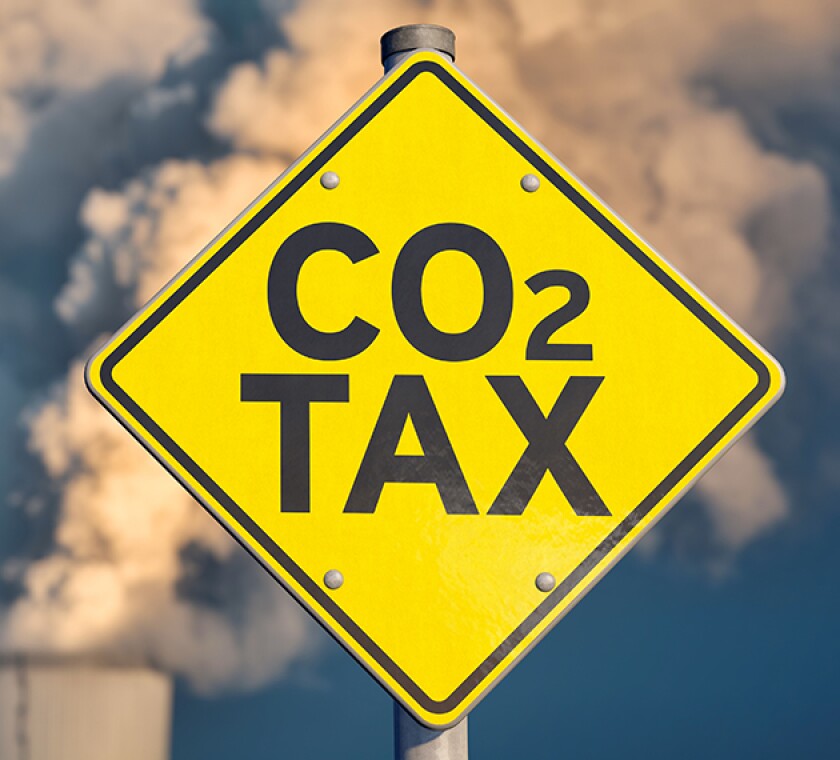Environmental issues are increasingly becoming major issues in many countries globally, especially the issue of carbon emissions, as carbon dioxide is notoriously known as a greenhouse gas that contributes significantly to global warming. As the global population and industry rapidly grow, carbon emissions are also increasing every year.
Indonesia is no exception to this growing environmental trend and issue. Several actions have been taken by the Government of Indonesia (the GoI) in the commitment to minimise production and consumption activities that generate carbon emissions by promoting and providing incentives for new and renewable clean energy while putting more pressure on fossil fuel-based industries to be cleaner and more efficient.
The GoI’s commitment is now increased by the recently introduced carbon tax together with revision of several other tax provisions in the new taxation legislation, Law Number 7 of 2021 concerning Harmonisation of Taxation Regulations (Undang-Undang Harmonicas’ Peraturan Perpajakan – HPP Law).
The HPP Law took effect on October 29 2021. By introducing the carbon tax, the GoI hopes to change the behaviour of businesses and consumers, particularly in consuming energy and goods sourced from fossil fuels, which will ultimately lead to a reduction of greenhouse gas emissions. The secondary effect of the carbon tax is to serve as a new source of state revenue and funding in the battle against environmental damage.
Background of the GoI
The GoI is of the view that there are several instruments that can be utilised to achieve the target of nationally determined contribution (NDC). One of these is the instrument of carbon economic value (CEV) which consists of trading or non-trading instruments. NDC is the national commitment for handling global climate change to achieve the goals of the Paris Agreement to the United Nations Framework Convention on Climate Change.
The non-trading instruments include, inter alia, imposition of a carbon tax. The carbon tax is introduced by the GoI in the framework of controlling greenhouse gas emissions to support Indonesia’s NDC achievement.
The carbon tax is imposed upon carbon emissions that create negative impacts for the environment, such as deterioration of natural resources, environmental pollution, and environmental damage.
Understanding the terms
Most of the ideas of the carbon tax revolve around the tax on fossil fuels (oil, coal, natural gas) which naturally are the source of greenhouse gas emission. In fact, Indonesia already imposed a tax on the fuels more than 15 years ago, i.e. the vehicle fuel tax, which is regulated under regional taxes (Pajak Daerah) with a maximum rate of 10%. The rate of the vehicle fuel tax is stipulated and collected by the government of each province and, in special cases, such as for price stabilisation, the President can adjust the vehicle fuel tax rates.
The carbon tax, on the other hand, will be an additional tax to the vehicle fuel tax, not serving as a substitute, as the carbon tax is regulated under different tax legislation. The carbon tax also has broader objects compared to the vehicle fuel tax, which specifically aims at fuel for motor vehicles.
|
|
“Once the more detailed implementing regulation, especially on the carbon tax calculation, is issued, it is advisable for businesses to reassess and review their tax obligation profile and carefully adjust their business strategy accordingly.” |
|
|
The carbon tax is imposed on both individuals and entities that purchase goods containing carbon or performing activities which produce carbon emissions. The carbon tax is payable upon the following events: the purchase of goods containing carbon; at the end of the calendar year for activities that produce a certain amount of carbon emission; or upon other events which will be further regulated under or based on a government regulation.
The ‘carbon emission’ referred to in the HPP Law is the carbon dioxide equivalent (CO2e). The CO2e is a representation of emission of greenhouse gases, e.g. carbon dioxide (CO2), dinitro oxide (N2O), and methane (CH4).
The ‘goods containing carbon’ is defined as goods including but not limited to fossil fuels which produce carbon emissions.
The ‘activities which produce carbon emission’ are activities which produce or emit carbon from sectors including, among others, energy, farming, forestry and land conversion, industry, and waste.
The ‘purchase’ covers purchasing of goods which produce carbon emissions, both local and import purchases.
The rate of the carbon tax in the HPP Law is stipulated as no lower than the carbon price in the carbon market per kilogram of carbon dioxide equivalent (CO2e) or other equivalent units, with the lowest rate set at IDR 30 ($0.21) per kilogram CO2e or the equivalent units.
The market price is meant to follow the development and changes in the global carbon market, and the minimum rate is to prevent the carbon tax rate from getting too low, which may cause taxpayers to disregard the effect and continue the activities producing carbon emissions as usual as if there were no carbon tax.
The Minister of Finance, after consulting with the Indonesian House of Representative, will set the carbon tax rate and the tax base. The addition of objects of the carbon tax will be regulated by or based on a government regulation after the GoI submits to the Indonesian House of Representatives to be discussed and agreed in the draft state budget.
Through these provisions, the GoI expects to cover all aspects of greenhouse gas emissions and also provide room for additional carbon tax objects and rates to adapt to and anticipate the future development in human activities which produce significant emissions.
Taxpayers participating in the carbon emission trade, carbon emission offset, or other similar mechanism may enjoy a carbon tax reduction or other special treatment on their carbon tax obligation fulfillment. The ‘carbon emission trade’ is defined by the HPP Law as a transaction mechanism between businesses and/or activities which produce emissions exceeding the predetermined upper limit of emissions.
‘Carbon emission offset’ is defined as the reduction of carbon emission by a business and/or activities to compensate for the emission made in other locations. The reduction and special treatment are aimed to encourage and provide incentives for taxpayers that wish to have more effective and environmentally-friendly business operations (a reward and punishment mechanism) and less dependence on fossil-fuel-based energy. This summarises the GoI policy on the carbon tax into cap, tax, and trade.
The initial philosophy of the carbon tax was as a tool for controlling and minimising greenhouse gas emissions and its negative impacts and, therefore, the revenue from the carbon tax can be allocated by the GoI to climate change control based on a government regulation after it is submitted to the House of Representatives and agreed in the draft state budget.
As the time of writing, the GoI has not yet issued further implementing regulations including the government regulation for administration of carbon tax including its calculation, reduction or special treatments, payment, or reporting mechanism. However, it is indicated that the general administration and compliance fulfillment of the carbon tax will follow the provisions as in the Law on General Provisions and Procedures in Taxation.
The imposition of the carbon tax will be implemented by considering the carbon tax road map and/or the carbon market road map.
Road map of carbon tax
The GoI has set up a general carbon tax road map in the HPP Law. The carbon tax road map contains the following policies:
The strategy of carbon emission reduction, in which the GoI has committed to reduce the greenhouse gas emission in 2030 by 29% through its own effort and with international support by 41%, and aiming for net zero emission (NZE) no later than 2060.
Target of priority sectors, in which the main sector priorities of greenhouse gas emission are the energy and transportation sector and the forestry sector, which together already cover 97% of NDC. The other sectors will follow the transformation of clean-energy-based national industry aiming for Golden Indonesia in 2045 and NZE no later than 2060. By focusing on the highest-contributing sectors in carbon emission, it is expected to have faster achievement of the carbon emission reduction target.
Consideration of the new and renewable energy development, which includes the combination of carbon tax policy, carbon trade, and other sectoral technical policies, including among others phasing out coal, the development of new and renewable energy, and the improvement of natural diversification which supports NZE 2060 by putting forward the principle of just and affordable transition for the community and business certainty. The principle of just and affordable transition is critical to create a level playing field between sectors so that the transition does not create significant costs which are impossible to afford, such that the transition cannot be realised.
Harmonisation among policies, in which the further implementation will be regulated by or based on a government regulation. This harmonisation is very important as there are several past cases of overlapping and conflicting regulations of different government departments or agencies, including sectoral ego which may result in a counterproductive business climate.
Based on the HPP Law, the closest and most apparent implementation of Carbon Tax focusses on the coal-based electric power plant sector in 2022 up to 2024 based on the emission limit (cap and tax).
It is well known that many Indonesian power plants are producing steam-generated electricity fueled with coal, which notorious for producing carbon dioxide in significant amounts. This is not surprising, as coal is considered the cheapest source of fuel for steam-generated electricity. The carbon tax will apply from April 1 2022 for coal-based electric power plants with a rate of IDR 30 per kilogram CO2e.
The period from 2025 onward is planned by the GoI to be the full implementation of the carbon emission trade as well as incremental expansion of the sectors which will be subject to the carbon tax. This expansion of sectors subject to carbon tax will consider the sectors’ readiness, economic situation, effects, and scale.
Although both individual and corporate taxpayers are subject to carbon tax, the carbon tax regulation prioritises corporate taxpayers, as corporate taxpayers are fewer and often easier to manage and have better resources compared to individual taxpayers.
Anticipated impact
Clearly, this newly introduced carbon tax will increase the administrative burden and costs of business in Indonesia, especially for corporate taxpayers, which may further be translated into increased selling prices of products or services to the customers.
This situation, combined with the increase of the VAT rate from initially 10% to 11% on April 1 2022 and to 12% no later than January 1 2025, may significantly change customer behaviour in considering their purchases, especially for non-basic needs with high prices.
An expected price increase in the short term, particularly for electricity, fuel, and production materials, should be considered, especially in determining the taxpayer’s future business strategies during the recovery process after the severe economic impact of COVID-19, where careful consumer spending considerations are involved.
Once the more detailed implementing regulation, especially on the carbon tax calculation, is issued, it is advisable for businesses to reassess and review their tax obligation profile and carefully adjust their business strategy accordingly.
Businesses also expect that the carbon tax administration and compliance will be simple and easy to calculate without grey areas or provisions that are open to interpretation, to minimise the risk of potential future tax disputes, since tax disputes in Indonesia are known as having quite a lengthy process to obtain the final result. This is very important in developing business certainty and predictability in Indonesia to attract more investment.
Businesses and future investment in Indonesia should start considering more seriously the vision of being more environmentally-friendly in the future daily business operations, which will result in a lower carbon tax amount and further translate into a competitive advantage over their competitors by lower prices and promoting environmentally-friendly products and services.
Despite the above, which may be considered as short-term, the carbon tax should be a plausible long-term policy that aims for better environmental conditions in the future by reducing the usage of fossil fuel and focusing more on new and renewable energy to have a better earth for future generations. As we know, we have only one earth to live on, at least for now.
Ahdianto |
|
|---|---|

|
Partner GNV Consulting T: +62 81 2100 4451 Ahdianto is a partner at GNV Consulting with more than 22 years’ experience in tax, customs, and business consulting. He is known for his litigation expertise in the Tax Court. Ahdianto has engaged in several tax projects such as performing tax diagnostic reviews, tax dispute settlements, and corporate tax restructuring. He is also a specialist at obtaining tax and customs facilities, and securing tax and customs refunds. He has broad experience in strategic planning and representation in the Indonesian Tax Court for multinational companies. Ahdianto was named as an indirect tax leader and as a tax controversy leader by ITR World Tax for 2020 and 2021. He led the GNV Consulting team to win national awards for Tax Disputes & Litigation Firm of the Year in the 2018 and 2020 ITR Asia Tax Awards. He is a licensed tax court attorney and holds the highest professional certification of a tax and customs consultant. |
Aditya Wicaksono |
|
|---|---|

|
Director GNV Consulting T: +62 821 3890 8070 Aditya Wicaksono is a director at GNV Consulting with more than 13 years’ experience in the tax, customs, and business consulting world. Aditya is well-experienced in handling tax compliance, advisories, diagnostic reviews, and tax and customs dispute resolution, which involves the settlement of cases at the tax office and tax court levels, for several clients across various industries. He is also experienced in other corporate services such as merger and acquisition (M&A) projects, tax and customs facilities issues, and liquidation. Aditya holds a master’s degree in Business Administration, majoring in Finance, from the Gadjah Mada University. He is licensed as both tax and customs and excise court attorney and holds the highest professional certification as tax consultant and customs and excise consultant. |













